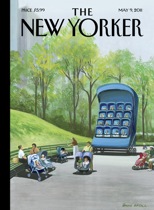 From Kalefa Sanneh’s review of recent reality-TV criticism in the 9 May 2011 New Yorker:
From Kalefa Sanneh’s review of recent reality-TV criticism in the 9 May 2011 New Yorker:
Makeover shows inevitably build to a spectacular moment when “reveal” becomes a noun, and yet the final product is often unremarkable: a woman with an up-to-date generic haircut, wearing a jacket that fits well; a man who is chubby but not obese; a dog with no overwhelming urge to bare its fangs. The new subject is worth looking at only because we know where it came from, which means that, despite the seeming decisiveness of the transformation, the old subject never truly disappears. “The After highlights the dreadfulness of the Before,” [Brenda R.] Weber writes [in her book, Makeover TV: Selfhood, Citizenship, and Celebrity]. “In makeover logic, no post-made-over body can ever be considered separate from its pre-made-over form.” She might have added that no makeover is ever really finished; there is no After who is not, in other respects, a Before—maybe your dog no longer strains at the leash, but are you sure that sweater doesn’t make you look old and tired? Are you sure your thighs wouldn’t benefit from some blunt cannulation? Weber’s makeover nation is an eerie place, because no one fully belongs there, and, deep down, everyone knows it.
One thought on “Very Good Paragraphs”